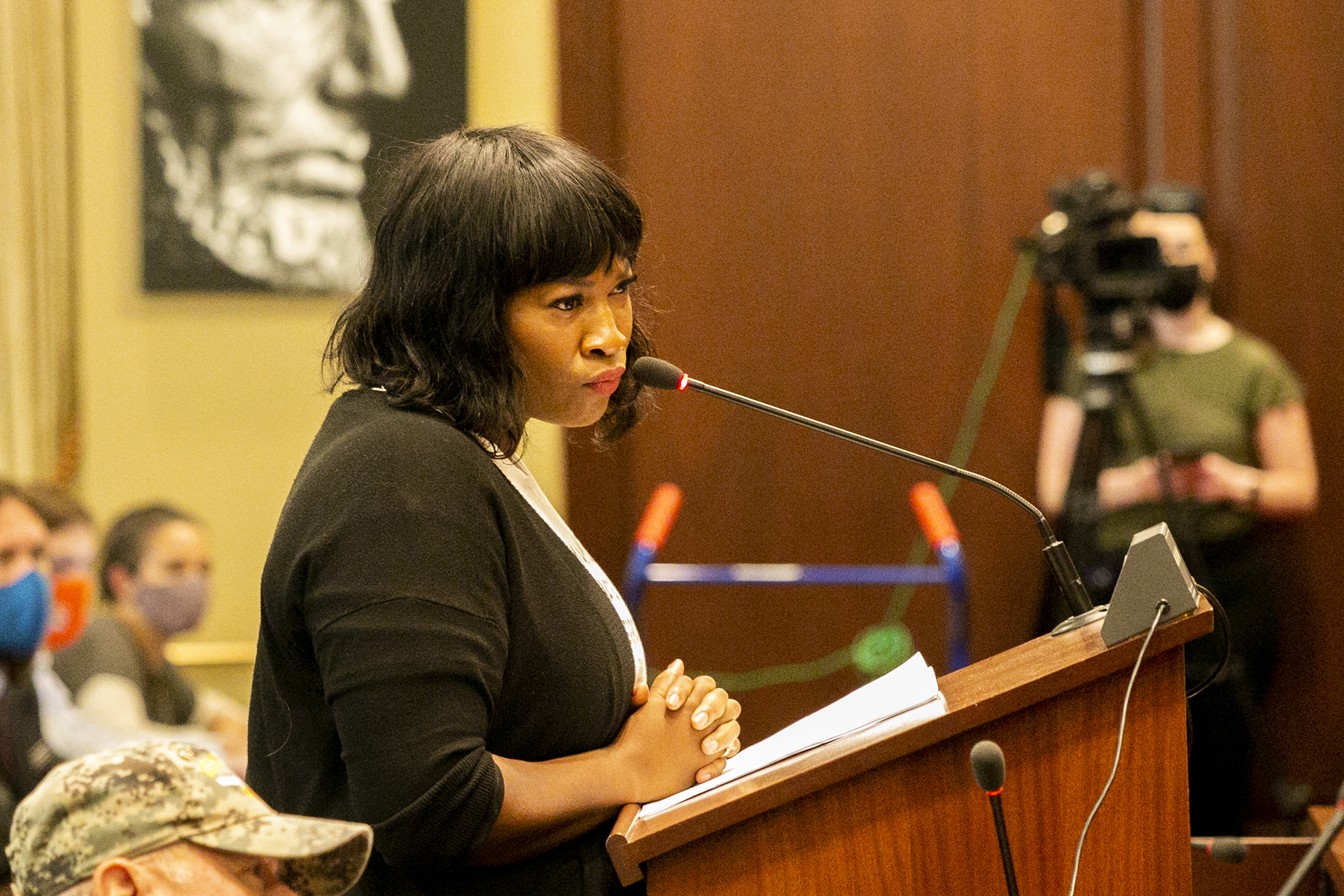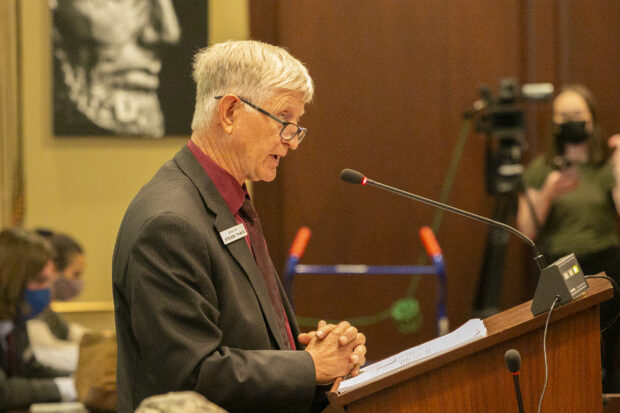
Lt. Gov. Janice McGeachin’s education indoctrination task force made a half dozen recommendations to the Legislature Thursday that ranged from targeting critical race theory to categorically endorsing school choice.
Thursday afternoon marked the first time the committee made recommendations or accepted live public testimony. It was the fourth and final scheduled meeting of the task force, first established amid a statewide debate over alleged leftist teachings in schools. McGeachin convened the task force to protect “young people from the scourge of critical race theory, socialism, communism, and Marxism” in Idaho schools.
After hearing four-plus hours of testimony split on whether indoctrination is a problem in public schools, the task force unveiled and approved six proposals, which were not published ahead of the meeting or the testimony period.
Recommendations included:
- Repealing and replacing Idaho’s new law dealing with critical race theory, which prohibits forcing students to “affirm, adopt, or adhere” to certain teachings, including that one race or sex is superior or that people are responsible for the actions of their ancestors because of their race. McGeachin suggested a new version that defines critical race theory, which is not defined in the current law.
- Recommending the State Board of Education and State Department of Education identify and resolve conflicts between their own administrative rules and a piece of the Idaho Constitution dealing with religious and sectarian teachings in schools, Article 9, Section 6. It’s unclear which rules the task force was referring to.
- Banning the use of federal grant money “which promotes the practice of Critical Theories, or any educational model which promotes race-based stereotypes and biases, or makes claims that any particular race or American system is inherently racist.” The proposal identifies a Biden administration rule, which is not itself a grant, that prioritizes culturally responsive teaching and information literacy when awarding some federal dollars.
- Inviting House and Senate education committee members to work with the task force to develop policies for the next legislative session. The task force needs cooperation from these committees, since it has no lawmaking power of its own and wasn’t established by the Legislature.
- Submitting written testimony to the State Board about a diversity policy the board is considering. Task force members criticized the policy and the State Board at past meetings.
- Supporting “education choice for Idaho parents.” The pro-school-choice message suggested setting up education savings accounts for school-age children, putting government education funds into debit card-connected accounts to be used on private school tuition, homeschooling and other education-related costs. The proposal also said money could be spent on public and charter school enrollment, which currently must be free under the Idaho Constitution; no one elaborated on whether that would change. Task force member Ryan Spoon, who pushed the recommendation, said it would allow students to leave schools where critical race theory is being taught.
“I’m supportive of the motions we have passed so far,” Spoon said, “But I believe that the one we are considering now (pushing education savings accounts) is the only way that we will affect true change in our school system.”
Earlier meetings foreshadowed some of these recommendations. The task force has frequently voiced frustration with state education players, including the State Board of Education, and defining critical race theory — achieved or not in over a dozen hours’ worth of meetings this summer — was repeatedly discussed. But using the wide-ranging umbrella of school choice to combat alleged indoctrination was a new approach Thursday, and a handful of dissenters said they thought school choice was outside of their stated purpose of looking at indoctrination in schools.
All proposals were approved on voice votes, with those dealing with federal grants and school choice pulling the only “nays.”
What the task force heard
The Statehouse’s Lincoln Auditorium that has hosted the meetings was at its emptiest Thursday, with around 40 attendees dwindling to under a dozen over the nearly five-hour meeting.
Still, over a dozen people testified, with some commending the task force’s mission with anecdotes about school indoctrination and others lambasting what they saw as baseless attacks on public education.
Dominik Sparling, a Boise High School graduate and Boise State University sophomore, said he would like to be a government teacher and raise kids in Idaho. He told the committee he’s a registered Republican, but he’s worried that the critical race theory controversy has left instructors “walking on eggshells.” Teachers he knows have stopped teaching about current events, he said. He worries that if the task force curbs what teachers can talk about — by rule or by fear — Idaho could begin to resemble the restrictive environment his mother experienced growing up in the Soviet Union.
Sen. Steven Thayn, Chairman of the Senate Education Committee, said critical race theory is Marxist in nature, and contemplates using centralized power to combat systemic racism.

“I do think critical race theory is a threat to our system of limited government,” said Thayn, R-Emmett.
But Thayn said critical race theory could be replaced by something he considers worse. He advocated that school boards take a role in strengthening curriculum, and urged people to pay attention when Idaho’s history education standards come up for revision in the coming years.
Thayn was joined by House Education Committee member Tony Wisniewski, R-Post Falls, and briefly by Sen. Regina Bayer, R-Meridan, as the only lawmakers in the crowd. It was the first time more than a pair of elected officials have been in the room at the task force meetings. Usually, co-chairs Rep. Priscilla Giddings, R-White Bird, who is running for lieutenant governor in 2022, and McGeachin, who is running for governor, are the only such officials.
Testifiers hadn’t seen proposals
Since the recommendations weren’t made available to the public ahead of time, none of the hours of testimony commented specifically on the proposals.
At the group’s last meeting a month ago, McGeachin said that “in all fairness and transparency,” the task force would likely post the recommendations before the August meeting for the public to review.
“Even though we’re not recognized as a legitimate legislative committee, we’re still trying to abide by principles of transparency and accountability, to have those things posted so that anybody who wants to come and testify will have time to see what we’re talking about,” she said in July.
The proposals were never posted online.
McGeachin said Thursday that the recommendations hadn’t even been typed up until that same morning.
An EdNews public records request for the proposals made Monday was granted less than an hour before the meeting began, but no McGeachin staffers were available to provide the records until after the meeting.
Boise High School student Shiva Rajbhandari criticized the task force for only accepting public comments now that most teachers and students were back in classrooms and pointed out that remote testimony wasn’t allowed. (However, board member Laura Van Vorhees read pro-task force testimony on one person’s behalf.) Local students had been protesting at some of the task force meetings over the summer, but few were in attendance at the early afternoon meeting on Thursday, which started during school hours.
“If it weren’t for that … I can guarantee you that this room would be packed just as it was in the summer with empowered young people working to defend their constitutionally protected rights to freedom of expression,” Rajbhandari said, before condemning the task force for attempts at “bringing Idaho back to the 1800s” with restrictions on race education.
With its scheduled meetings complete, the task force will now work to forward and make more specific its “broad” policy goals, McGeachin said.
Whether enough legislators will listen to affect policy change remains in question.
Idaho Education News reporter Kevin Richert contributed to this report. For play-by-play coverage, read his live blog.
Disclosure: EdNews was recently party to an Idaho Press Club lawsuit against McGeachin over the release of public comments to the task force. Thursday, a judge ruled in favor of the Press Club.
